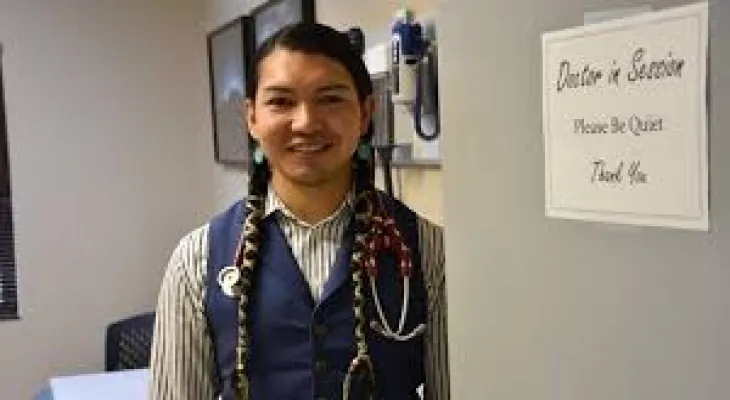Search here
Newspaper
Search here

Arab Canada News
News

Published: April 22, 2024
A new study published in the Canadian Medical Association Journal suggests that systemic racism and inequality in healthcare may contribute to why First Nations patients in Alberta disproportionately leave emergency departments without being seen or receiving medical advice.
The peer-reviewed study builds upon previous research that found nearly seven percent of First Nations patients’ visits to emergency departments ended with them leaving without care, compared to about four percent of visits from non-First Nations patients.
The team examined regional administrative data for more than 11 million emergency department visits in Alberta from 2012 to 2017, controlling for patient age, geography, visit reasons, and facility types.
Patrick MacLean, assistant professor in the Department of Emergency Medicine at the University of Alberta and co-author of the study, stated, "First Nations patients, when we control for all these other factors, are more likely to leave without completing care."
Researchers also asked 64 health managers, emergency care providers, and First Nations patients to comment on their quantitative findings through participatory circles, focus groups, and phone interviews from 2019 to 2022.
MacLean co-led the study with Leah Bell, executive director of the First Nations Information Governance Center in Alberta, and partner organizations of the chiefs and First Nations helped shape the study and interpret its results.
Racism and Stereotypes
Participants in the study, while commenting on the quantitative results, raised several reasons why First Nations patients leave emergency departments without receiving care.
They shared stories of providers discriminating against First Nations patients and relying on stereotypes about them.
One participant, quoted in the study, stated that they left one healthcare facility and visited another after the doctor’s first question was how much alcohol they had been drinking.
Another participant mentioned hearing racist outbursts in the nurses’ station in the emergency department.
Participants also pointed to other barriers to receiving care, such as long wait times, availability of transportation, and healthcare specialists using medical terminology when speaking with patients.
Chief Samuel Crowfoot stated that the study reflects what members of his community southeast of Calgary have long experienced: misdiagnosis, being targeted by hospital security, and doctors assuming they are intoxicated.
First Nations members were encouraged to share stories related to racism and discrimination in healthcare and signed a pact with Alberta doctors to address both issues.
Benedict Crow, chief of the Siksika Nation, filed a human rights complaint last year against Alberta Health Services (AHS) and one hospital, claiming that discrimination against Indigenous peoples led to the death of his wife, Mira Crow.
At the time, AHS stated they could not comment on the specific case but affirmed that racism and discrimination have no place within the organization.
In a statement on Friday, AHS spokesperson Kerri Williamson acknowledged that some Indigenous peoples face barriers to healthcare because they do not feel safe or welcomed within the healthcare system.
“This needs to change,” she said.
AHS continues to implement a roadmap to improve care for all Indigenous peoples in Alberta and expand the Indigenous Wellness Centre (IWC), which works with Indigenous communities and partners to provide culturally appropriate healthcare for Indigenous peoples in Alberta.
Williamson stated, "By building meaningful relationships and listening to Indigenous communities, we will continue to build partnerships that enhance the health and wellness of Indigenous patients and their families together."
Crowfoot mentioned that the issue goes beyond Alberta and hopes other First Nations will file complaints on behalf of members experiencing discrimination.
“It’s very frustrating because these stories are widespread, and we will bring them up as many times as we need to until we see a significant change,” he said.
Disrupted Care
The study's authors noted that their findings show disproportionate disruptions in the care of First Nations patients.
The team found that a larger proportion of First Nations patients returned to the emergency department within 72 hours of leaving. Approximately one in 20 patients, both First Nations and non-First Nations, requires hospitalization upon returning.
The findings align with research that found more Indigenous patients chose to leave emergency departments before being seen.
In previous studies, MacLean and colleagues discovered that First Nations patients in emergency departments tend to receive a lower level of care compared to other patients.
Patient Retention Strategies
The authors of the Alberta study suggested that providers and emergency departments work with First Nations on strategies to retain First Nations patients.
Dr. James Makokis, a family doctor from Saddle Lake Cree Nation, stated that emergency care providers should adhere to basic triage principles, take patients’ vital signs, and take extra steps to communicate with and check in on Indigenous patients.
He added that around-the-clock transportation could help individuals living in First Nations that may be several hundred kilometers from a hospital.
He stated that improving access to primary care could also reduce the strain on overloaded emergency department staff.
Both Crowfoot and Makokis emphasized that complaint processes should be simplified so that patients find it easier to report racism and discrimination when it occurs.
Makokis added, "Until we are truly ready to address these issues in a meaningful, substantive, and sincere transformative way, we will continue to see outcomes like this."
Comments